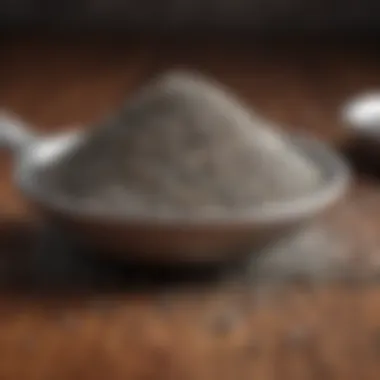Chia Seeds: A Powerful Ally for Weight Loss


Intro
Chia seeds are small black or white seeds derived from the Salvia hispanica plant. In recent years, they have gained attention for their potential role in weight management and overall health support. Including chia seeds in your diet can be an effective strategy for those looking to lose weight. This article aims to explore the various benefits of chia seeds, practical application methods, and easy recipes to seamlessly integrate them into daily routines.
Understanding the significance of chia seeds requires recognizing their nutritional composition, which is rich in fiber, protein, and omega-3 fatty acids. These elements play a pivotal role in weight loss and overall health. Being aware of how to prepare and consume chia seeds enhances their benefits, making it essential for anyone interested in utilizing this ingredient for weight management. Here, we will break down the health benefits and practical tips that allow chia seeds to shine as a valuable addition to a healthy lifestyle.
Intro to Chia Seeds and Weight Loss
Chia seeds have emerged as a widely recognized superfood. Their growing popularity among health-conscious individuals stems primarily from their numerous health benefits and nutritional value. This section will explore the relationship between chia seeds and weight loss, discussing their unique contributions to a balanced diet.
Understanding Chia Seeds
Chia seeds are tiny, edible seeds from the Salvia hispanica plant. They are rich in nutrients, making them a valuable addition to any diet. These seeds contain high levels of omega-3 fatty acids, protein, fiber, and various vitamins and minerals. When added to meals, they can absorb water, expanding in size, which may help promote feelings of fullness. For those aiming for weight loss, this characteristic is particularly beneficial. The nutritional density of chia seeds makes them an efficient option for those looking to reduce caloric intake while still receiving essential nutrients.
Why Weight Loss Matters
Weight loss is not merely a cosmetic concern; it plays a crucial role in overall health. Excess weight is associated with numerous health risks, including heart disease, diabetes, and certain types of cancer. Moreover, achieving and maintaining a healthy weight can improve one’s quality of life. It can boost self-esteem and decrease the likelihood of developing psychological issues related to body image. Thus, understanding the role of effective dietary strategies, such as incorporating chia seeds, can aid individuals on their weight loss journey.
In summary, chia seeds stand out due to their nutrient profile and potential impact on weight management. As we delve deeper into how to prepare chia seeds and incorporate them into daily diets, the foundational benefits discussed here set the stage for practical applications in achieving healthier lifestyles.
Nutritional Profile of Chia Seeds
Chia seeds have gained notoriety as a nutrition powerhouse. Their nutritional profile plays a crucial role in their effectiveness for weight loss. Comprising essential nutrients, chia seeds offer various health benefits while being low in calories, making them suitable for anyone looking to manage their weight more effectively. A comprehensive understanding of their nutritional elements aids in maximizing their benefits and integrating them into a daily diet.
Caloric Content
One of the most significant aspects of chia seeds is their low caloric content. A typical serving, approximately two tablespoons (28 grams), provides around 138 calories. This low energy density allows individuals to consume chia seeds without excessive caloric intake. This fact makes them attractive for those aiming to lose weight or maintain a healthy lifestyle. The minimal calorie count means that chia seeds can enhance meals without leading to unwanted weight gain.
Fiber and its Role in Weight Management
Chia seeds are particularly rich in dietary fiber. A standard serving of chia seeds contains about 10 grams of fiber, which contributes to improved digestive health. High fiber content plays a pivotal role in weight management. It promotes feelings of fullness, helping to curb overeating. When consumed, chia seeds absorb water and expand, creating a gel-like consistency. This process increases satiety. Consequently, individuals may find it easier to control their appetite. Incorporating chia seeds into meals can thus be a strategic approach to weight loss.
Essential Fatty Acids
Another remarkable feature of chia seeds is their high content of essential fatty acids, chiefly omega-3 and omega-6 fatty acids. These beneficial fats are important for heart health and have been linked to reduced inflammation in the body. A serving of chia seeds contains approximately 5 grams of omega-3 fatty acids, primarily in the form of alpha-linolenic acid (ALA). Consuming sufficient omega-3s can contribute to overall well-being, and the presence of these fats can also help promote a balanced diet.
Protein Benefits
Despite being primarily known for their fiber and healthy fats, chia seeds also contain a notable amount of protein. A two-tablespoon serving has about 4 grams of protein. Protein is essential for muscle maintenance and repair, which is particularly important for those engaging in physical activity as part of a weight loss regimen. Protein can also promote satiety, reducing hunger between meals. Thus, adding chia seeds to your diet can enhance protein intake alongside the other nutritional benefits they offer.
"Chia seeds provide a balanced source of nutrients that support weight loss while ensuring adequate nutrition."
By acknowledging these components—caloric content, fiber, essential fatty acids, and protein—individuals can better appreciate the role of chia seeds in weight loss and overall health.
Health Benefits of Chia Seeds
The incorporation of chia seeds in a diet extends beyond merely aiding weight loss. They possess a variety of health benefits worth considering. Understanding these advantages helps health professionals and those interested in wellness to promote chia seeds as an integral component of a balanced diet. Notably, these seeds are often celebrated not just for caloric binding but for their holistic contributions to bodily well-being.
Digestive Health


Chia seeds are an exceptional source of dietary fiber, containing approximately 10 grams per ounce. This fiber plays a crucial role in promoting digestive health. When chia seeds come in contact with liquid, they can absorb up to 12 times their weight, forming a gel-like substance. This characteristic not only aids in slowing digestion, providing a sense of fullness, but also helps maintain regular bowel movements.
Incorporating chia seeds into meals can enhance gut health by promoting the growth of beneficial gut bacteria. Their high fiber content ensures adequate nutrient absorption and prevents constipation. These benefits contribute significantly to an overall weight loss strategy because a healthy digestive system is often pivotal in maintaining a healthy weight.
Cardiovascular Health
The heart health benefits of chia seeds are notable. They contain significant amounts of omega-3 fatty acids, particularly alpha-linolenic acid (ALA). Omega-3s are essential fats that contribute to reducing inflammation in the body, lowering blood pressure, and decreasing the risk of heart disease. Regular consumption of chia seeds can support the body's lipid profile and reduce triglyceride levels.
Furthermore, chia seeds are rich in antioxidants, which combat oxidative stress and inflammation—factors associated with heart disease. By fostering cardiovascular health, these seeds indirectly support weight loss by enhancing overall vitality. A healthy heart ensures efficient blood circulation, which is crucial during physical activities associated with weight management.
Antioxidant Properties
Antioxidants are compounds that fight free radicals in the body, potentially reducing the risk of chronic diseases. Chia seeds are rich in antioxidants such as quercetin, kaempferol, and chlorogenic acid. These antioxidants contribute to reducing oxidative stress and promote cellular health.
When weight loss efforts are in play, oxidative stress can be a concern due to the body’s increased metabolic rate. Therefore, the intake of chia seeds can help mitigate this effect. By protecting the body from oxidative damage, chia seeds support overall health. Additionally, their antioxidant properties aid in recovery post-exercise, making them a suitable option for those involved in a weight loss regimen.
"Chia seeds' nutritional richness not only assists in weight management but also contributes to crucial health benefits like digestive and cardiovascular health."
How to Prepare Chia Seeds
Preparing chia seeds for weight loss is an essential step, as it influences their effectiveness and flavor in various dishes. Understanding the right preparation methods ensures optimal nutrient absorption and enhances their satiating properties, which aids in weight management. Here, we will explore some practical methods for preparing chia seeds, elaborating on the benefits and considerations of each.
Soaking Method
The soaking method is a popular way to prepare chia seeds. When soaked, these seeds absorb liquid and expand, creating a gel-like consistency that can increase satiety. By doing so, they may help control hunger, making it easier to eat less during meals. To soak chia seeds, follow these simple steps:
- Measure out the desired amount of chia seeds, generally one to two tablespoons.
- Place the seeds in a bowl or jar and add liquid, such as water or almond milk. Use a ratio of about 1:4, meaning for every tablespoon of chia seeds, add four tablespoons of liquid.
- Stir the mixture well to prevent clumping, then let it rest for at least 30 minutes. For best results, refrigerate the mixture for a few hours or overnight.
After soaking, the seeds will have absorbed the liquid and developed a gel-like texture. This gel can be incorporated into various recipes or eaten directly. The soaked chia seeds hydrate the body and add a boost of nutrition without excessive calories.
Chia Seed Gel Preparation
Chia seed gel preparation is a specific application of the soaking method. It is useful for those who want a versatile ingredient for multiple dishes. The gel can be added to smoothies, puddings, and baked goods, lending nutritional value and texture without altering flavors significantly. To create chia seed gel:
- Follow the same soaking method mentioned previously.
- Allow the mixture to sit until a thick gel forms, which usually takes about 30 minutes.
- Store the gel in an airtight container in the refrigerator for up to one week.
Chia seed gel is an excellent option for baking, as it can serve as a binding agent, similar to eggs, thus providing a vegan-friendly alternative. Additionally, it is calorie-efficient and nutrient-dense, making it a smart choice for weight loss diets.
Incorporating into Recipes
Incorporating chia seeds into recipes is a simple way to harness their benefits. Their mild flavor allows them to blend seamlessly into various dishes, enhancing both nutrition and texture. Here are some ideas:
- Chia Seed Pudding: Mix soaked chia seeds with your choice of sweeteners and flavors like vanilla or cocoa for a healthy dessert.
- Smoothies and Shakes: Add a tablespoon of chia seed gel to your morning smoothie for added fiber and omega-3 fatty acids.
- Baked Goods: Substitute chia seed gel in recipes for muffins or bread to increase fiber content and moisture.
- Chia Seed Water: Simply add soaked chia seeds to your water for a refreshing drink that also offers nutritional benefits.
Incorporating chia seeds not only boosts satiety but also complements the overall nutritional profile of meals. Their versatility makes it convenient to enhance a variety of recipes while adhering to weight loss goals.
Chia seeds can absorb over 10 times their weight in water, making them a powerhouse for hydration and feeling full.
Overall, understanding how to prepare chia seeds effectively is vital for maximizing their utility in a weight loss regimen. With the right techniques, you can make chia seeds an integral part of a healthy diet.


Chia Seed Recipes for Weight Loss
Chia seed recipes play a critical role in incorporating these nutrient-dense seeds into a weight management strategy. Not only do they offer rich nutrients, but they also provide various options for preparation, suited for diverse dietary preferences and restrictions. Including chia seeds in daily meals can enhance satiety, owing to their high fiber content. This, in turn, may lead to reduced intake of other calories throughout the day. Moreover, chia seeds offer versatility; one can consume them as a pudding, in smoothies, or even in baked goods, making it simpler to integrate into personal diets.
Chia Seed Pudding
Chia seed pudding is a popular way to consume chia seeds for weight loss. The preparation of chia pudding is straightforward and requires minimal ingredients. To create this dish, mix chia seeds with a liquid of choice, such as almond milk or coconut milk. Let it soak for at least two hours or overnight in the refrigerator. This allows the chia seeds to absorb the liquid and expand, creating a thick, pudding-like consistency.
The health benefits are notable. Chia pudding is rich in omega-3 fatty acids, calcium, and fiber. This meal can serve as a satisfying breakfast or snack option, keeping hunger at bay. Sweeteners like honey or maple syrup can be added, and toppings like fruits or nuts can enhance flavors while also adding more nutrients. This dish sustains energy and contributes to overall wellness, aligned with weight loss goals.
Smoothies and Shakes
Incorporating chia seeds into smoothies and shakes is another effective strategy for weight loss. They can be blended into the mixture without compromising texture or flavor. A simple recipe involves combining fruits, leafy greens, and a liquid base. Adding a tablespoon of chia seeds boosts the nutritional value significantly while also providing a thick consistency, which can be beneficial for feeling full.
Smoothies with chia seeds come with additional benefits. They provide a quick source of energy, which is beneficial before or after workouts. Moreover, this preparation can easily include proteins, making it an excellent meal replacement option. Choosing ingredients wisely, such as using low-sugar fruits and high-fiber vegetables, amplifies the weight loss challenge.
Chia Seed Water
Chia seed water is a lesser-known yet effective way to enjoy chia seeds. To prepare it, mix a tablespoon of chia seeds in a glass of water and let them sit for about 10 minutes. This method allows the seeds to swell, creating a gel-like texture, which may enhance hydration levels and support digestion.
Consuming chia seed water offers an easy way to increase fiber intake without hefty calories. It can be flavored with lemon or cucumber for a refreshing drink, especially during warm weather. This combination can be not only hydrating but also a tool for weight loss, encouraging a feeling of fullness with minimal caloric load.
Baked Goods
Using chia seeds in baked goods can be an innovative approach to enhancing their nutritional profile. Recipes for muffins, breads, or cookies can easily incorporate chia seeds, either as a whole seed or in ground form. They can act as a binding agent, especially in vegan recipes, while enhancing texture.
Opting for chia seeds in baked products engages even the sweet-toothed individual. The added fiber helps to maintain stable blood sugar levels, which can be crucial for weight management. If combining with whole grains, it can yield a product that is satisfying and nourishing. Keeping track of portion sizes is still necessary, but this incorporation brings a smart option to snacks or meals.
Chia seed recipes offer not just a way to lose weight, but also a pathway to enjoy nutritious, creative meals that support overall health.
Integrating these recipes into one's daily routine can move a person towards their weight loss journey. It transforms chia seeds from a simple seed into a delicious culinary experience.
Incorporating Chia Seeds into Your Diet
Incorporating chia seeds into one's diet can significantly enhance nutrient intake, especially when it comes to weight management. Chia seeds are small yet packed with benefits. They are rich in fiber, protein, and essential nutrients. This makes them an excellent addition for anyone serious about health. It is important to understand how much and how often to consume these seeds to reap their full benefits. Proper incorporation is key to utilizing their full potential in a dietary plan aimed at weight loss.
Daily Intake Recommendations
When discussing daily intake, moderation is essential. It is generally recommended to start with about one ounce, or roughly two tablespoons of chia seeds per day. This amount provides a good balance of nutrients without exceeding caloric intake. Nutritional guidelines suggest that this quantity can contribute to daily fiber needs, which is around 25 grams for women and 38 grams for men. However, it is wise to increase intake gradually. This helps the digestive system adjust to additional fiber. As always, hydration is crucial when consuming chia seeds due to their ability to absorb water.
Combining with Other Foods
Chia seeds can be versatile in pairing with various food items. They can be easily added to meals and snacks, enhancing both flavor and nutritional value. Here are some effective combinations:
- Smoothies: Adding chia seeds to smoothies can boost nutritional content.
- Yogurt: Mix chia seeds into yogurt for a healthy snack or breakfast.
- Baked Goods: Incorporate chia seeds into muffin or bread recipes.
- Salads: Sprinkle on salads for added texture and nutrition.
These combinations not only improve the overall nutrient profile of meals but also promote a sense of fullness. This could contribute positively to weight loss efforts.
Remember, the key is to find combinations that appeal to your palate while meeting your nutritional goals.


Potential Side Effects and Precautions
When discussing the benefits of chia seeds in weight loss, it is equally crucial to consider potential side effects and precautions. While chia seeds are widely recognized for their health benefits, they can pose risks if consumed inappropriately. Understanding these issues helps ensure that individuals can incorporate chia seeds safely into their diets without adverse effects.
Digestive Issues
Chia seeds can absorb significant amounts of water, expanding in size. This property can lead to digestive discomfort if not consumed correctly. Some individuals may experience bloating, gas, or cramping when they start incorporating chia seeds into their diet. To mitigate these issues, it is advisable to gradually increase the intake of chia seeds.
- Hydration is key. Adequate liquid consumption when eating chia seeds is important. Not drinking enough water can contribute to digestive problems.
- Start small. Begin with a lower dosage, such as one teaspoon per day, and gradually increase it to allow your digestive system to adjust.
- Soaking is beneficial. Soaking chia seeds before consuming them helps mitigate digestive discomfort. This process prepares the seeds for digestion by softening them.
"Proper hydration and gradual inclusion can help prevent digestive issues commonly associated with chia seeds."
Allergic Reactions
While rare, some people may have allergic reactions to chia seeds. Allergies can manifest in various ways, such as skin rashes, itching, or gastrointestinal distress. It is essential to be cautious, especially for individuals with known allergies to other seeds.
- Watch for symptoms. Symptoms like hives or difficulty breathing after consuming chia seeds should not be ignored. In such cases, seeking medical attention is crucial.
- Consult a doctor. If there’s a history of allergies to similar foods, it’s prudent to consult with a healthcare professional before adding chia seeds to your diet.
- Testing may help. Conducting an allergy test can help identify sensitivity to chia seeds.
When integrating any new food into your diet, awareness of potential side effects ensures a balanced and healthy approach. By taking these precautions, you can enjoy the benefits of chia seeds without compromising your health.
Chia Seeds in Weight Loss Regimens
Chia seeds are increasingly recognized for their potential role in weight loss regimens. Their unique composition offers several advantages that make them suitable for those aiming to lose weight and maintain a healthy lifestyle. These seeds are high in fiber, protein, and healthy fats, all of which contribute positively to satiety and overall nutrition.
Benefits of Chia Seeds
Including chia seeds in daily meals can lead to a decrease in overall caloric intake, as they help in managing appetite. When soaked, chia seeds can absorb significant amounts of water, expanding in volume. This action not only makes a person feel fuller but also delays gastric emptying, leading to a prolonged sensation of fullness. Another critical aspect is their low caloric content. A typical serving contains only about 60 calories, allowing for nutrient intake without excessive calories.
Furthermore, chia seeds provide a rich array of nutrients, such as essential fatty acids and antioxidants. These components support metabolic health and combat oxidative stress, which is crucial during weight loss.
Integrating with Exercise
Chia seeds can effectively complement exercise routines, enhancing both performance and recovery. Their carbohydrate content provides energy, making them an excellent pre-workout snack. For individuals engaged in rigorous physical activities like running or weight training, consuming chia seeds can boost endurance and hydration.
Including chia in post-workout meals aids in recovery due to their protein and omega-3 fatty acids, which help reduce inflammation.
"Combining chia seeds with a balanced diet and exercise can be a strategic approach to achieving weight loss goals."
In summary, integrating chia seeds into a fitness regime not only improves energy levels but also contributes to muscle repair and recovery after workouts.
Long-term Weight Management
In the context of long-term weight management, chia seeds offer sustainable benefits. Their ability to improve digestion through high fiber content can prevent weight regain after initial loss. Fiber promotes a healthy gut microbiome, which plays a substantial role in weight regulation.
Incorporating chia into everyday diets can make healthy eating habits easier. They can be added to a variety of meals, making it simple to enhance nutritional value without much effort. People who develop consistent habits with nutritious foods tend to maintain their weight more successfully over time.
End
In this article, the importance of incorporating chia seeds into a weight loss strategy cannot be understated. Chia seeds serve as a natural tool for enhancing overall health while supporting weight management goals. Their unique nutritional profile, which combines healthy fats, fiber, and protein, contributes to a feeling of fullness, aiding in appetite control. Additionally, their versatility allows for easy inclusion in various recipes, making it simpler to maintain a balanced diet.
Summary of Benefits
- Nutritional Density: Chia seeds pack a significant amount of nutrients in a small serving. They contain high levels of omega-3 fatty acids, fiber, and essential minerals like calcium and magnesium.
- Satiety Enhancement: The high fiber content in chia seeds forms a gel-like consistency when soaked in liquid, promoting a feeling of fullness which can help reduce overall calorie intake.
- Health Boost: Besides weight loss, chia seeds offer benefits such as improved digestive health, heart health, and a source of antioxidants, which combat oxidative stress in the body.
"Chia seeds are not just a weight loss aid; they are a superfood that provides numerous health benefits when included in the diet."
Final Thoughts
Embracing chia seeds as part of a weight management plan opens a variety of opportunities for health improvement. It is important for individuals to experiment with different preparation methods and recipes to find what best fits their dietary preferences. Integrating chia seeds effectively can enhance not only physical health but also mental well-being by fostering a balanced lifestyle. As more people become mindful of their dietary choices, chia seeds represent a reliable option to consider. Their simplicity in preparation and rich nutrient profile make them a valuable addition to everyday meals.















